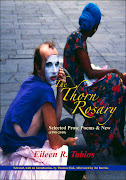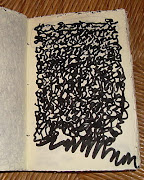APIA AVANT GARDE, Small Press Traffic, Dec 2011
I’m a poet who tries never to challenge what others say about my work. Some have criticized my poems. Some have loved my poems. Some have called it Filipino art. Some have called it insufficiently Filipino because I’m presumably a “Language poet.”* Some have called them “avant garde.” My official response? No comment. But I can share my discomfort with the topic at hand: avant garde. You see, I, among other things, do traffic in capitalist kitsch and mass culture. After all, I’m buying presents to place under so called “Christmas trees”—so-called because they’re also known as Hannukah bushes in my household. I’m not really making a joke. Do note my flexibility in accepting the term, Hannukah Bush. You see, I’m generally uncomfortable with the term “avant garde” because it is also a notion of separation, whether it’s separation from a particular type of politics, aesthetics or culture.
I am equally uncomfortable by instances where the term has evolved to focus more on aesthetic attempts to widen the outer limit of the artistic form. I note this as an aside today because the matter is an extra complication when considering Asian or Asian American work because we're tossing in there that which may be called "ethnic". In the past I have read elliptical poetry that doesn't seem particularly innovative but is deemed innovative when there's an ethnic marker popping up in its lines. Because it may be that touch of exotica to a reader uninitiated about Asian culture that, for them, renders the poem "new."
As a Filipino, including Filipino-American, poet, I come from a background—and thus write from a background—where colonialism has intruded and in some quarters continue to intrude. When I try to write from—and I do wish to write from—a more archetypal space than what's defined through a post-colonial lens, I remember this beloved image—an image from so-called indigenous or pre-colonial Philippine times. It's of a human standing with a hand lifted upwards such that if you happened to be at a certain distance and were to take a snapshot, it would look like the human was touching the sky.
That is the moment, the space, from which I attempt to create poems. In the indigenous myth, the human, by being rooted onto the planet but also touching the sky, is connected to everything in the universe and across all time, including that the human is rooted to the past and future—indeed, there is no unfolding of time. In that moment, all of existence—past, present and future—has coalesced into a singular moment, a single gem with an infinite expanse. In that moment, were I that human, I am connected to everything so that there is nothing or no one I do not know. I am everyone and everything, and everything and everyone is me. In that moment, to paraphrase something I once I heard from some German or Star Trek, “No one or nothing is alien to me.”
On the other hand, I think of how the avant garde, by fulfilling its role of critiquing something be it cultural or political, is inherently pushing for separation, or rather separations. In the avant garde, don’t you leave something behind for something else?
As regards poetry, I don't believe it's the poet's role to say whether a poem succeeded—and I believe this because I believe a poet only begins the poem and it's the audience or reader that completes it. So I wouldn’t want to advocate which of my poems, if any, have been successfully created from the archetypal space I described. Instead, I'd like to present an artwork by someone else that I believe fits my notion of what is avant garde: the Filipino American artist jenifer k. wofford. I believe her approach in some of her work is related to mine in poetry. An example is her “MacArthur Nurses” painting or series which take off from the iconic image of General Douglas MacArthur and other soldiers wading onto Philippine shores during World War II.

This is MacArthur landing on Leyte on Oct. 20, 1944, thus fulfilling a promise he had made 2.5 years earlier to the people of the Philippines to return: he returned with an enormous invasion force and the largest assemblage of naval vessels in the history of mankind. For MacArthur, the liberation of the Philippines from the Japanese was the culmination of the war. jenifer k. wofford took that image and reconstituted it into new paintings.

She replaced the figures of MacArthur and others who accompanied them back to the Philippines with Filipino nurses. The artist says the nurses could be conquering some new land or returning to their homes after many years—the fact that one image could capture both ends of the diaspora, which of course is the reality for many Filipinos, is brilliant. But I read this image further as autobiographical. jenifer k. wofford isn’t a nurse but the Filipina nurse is really among those in the front lines—the metaphorical avant garde—of the contemporary Filipino diaspora.
So the iconic image of MacArthur's return is not new. But wofford renewed it into her own. The evocation of departure and return is no longer that of an American general but of the diasporic citizenry in which there resides in many places, many individuals, a longing to return. My own family is filled with examples of people who’ve immigrated overseas for jobs, only to retire back to the Philippines as soon as they are able. It's an image that resonates, and certainly among Filipinos such that the Filipino overseas worker has been transcended individually into a so-called "national hero" in the Philippines, much in the same way that the new TIME magazine cover calls "The Protester" its TIME Person of the Year. jenifer k. wofford presents herself by presenting, not the individual let alone her individual self, but by presenting the many.
And no doubt about it: this work is adamantly avant garde by long-held tenets of avant gardism—it is a critique of the corruption and ineffective political strategy in the Philippines that forces the country to send its people overseas for work. Also a critique of the culture—whether you call it tribal or paternal—that makes corruption the state of play in terms of allocating resources to the country’s development. Also a critique of globalism and its many dark corners: from abused mail order brides to poorly paid workers to actual domestic slavery in some quarters…and so on.
Just as jenifer k. wofford did not effectuate such a moving work in isolation, I attempt new poems mired in the socio-political, which means inherently the autobiographical self. I’ll note some techniques I’ve used that overlap with some approaches used by some poets who’ve been called avant garde. These would be collage, the use of found material, the reliance on the materiality of language and last but not least abstraction. But I don’t use these techniques to get away from the self, my self (which some poets have said as a motivation). I use these techniques to include others (for example, others’ texts). And as regards abstraction, I don’t use that technique to say nothing autobiographical; I use it to listen to others. That is, if others interpret my abstract poems in the way a viewer may interpret an abstract painting, there is content coming from another person and my job as poet is to listen after I’ve provided the microphone. I am there, listening.
My avant garde self, in other words, is not a singular “me” or a self that fluctuates in identity. (When I was more active as an Asian American cultural activist, I remember the phrase often banded about: The fluctuating versus fixed self –I’ve used that, too, when forced to describe my work but I’m belatedly realizing it’s a reductive description. My self is an “ourselves.”) It is ourselves. This “ourselves” may empathize with many goals of the avant garde, but doesn’t separate from what is being critiqued. What evokes the protest is also part of that all-encompassing indigenous timeless space of human rooted to both planet and sky, thus being at one with the universe across all time. If I am an avant garde poet, it’s not because “I” am avant garde. It would be because we, all of us, are. This We, that is holding my hand writing the poem.
+++++++
Footnote *: This is also a misunderstanding of Language Poetry, a poetics I happen to much admire. But I wasn't insulted by the charge (because I admire those Langpos). I did lose ten pounds laughing about the "charge," however. As I was a tad overweight from all those Napa Valley wines, I appreciated the moment...


